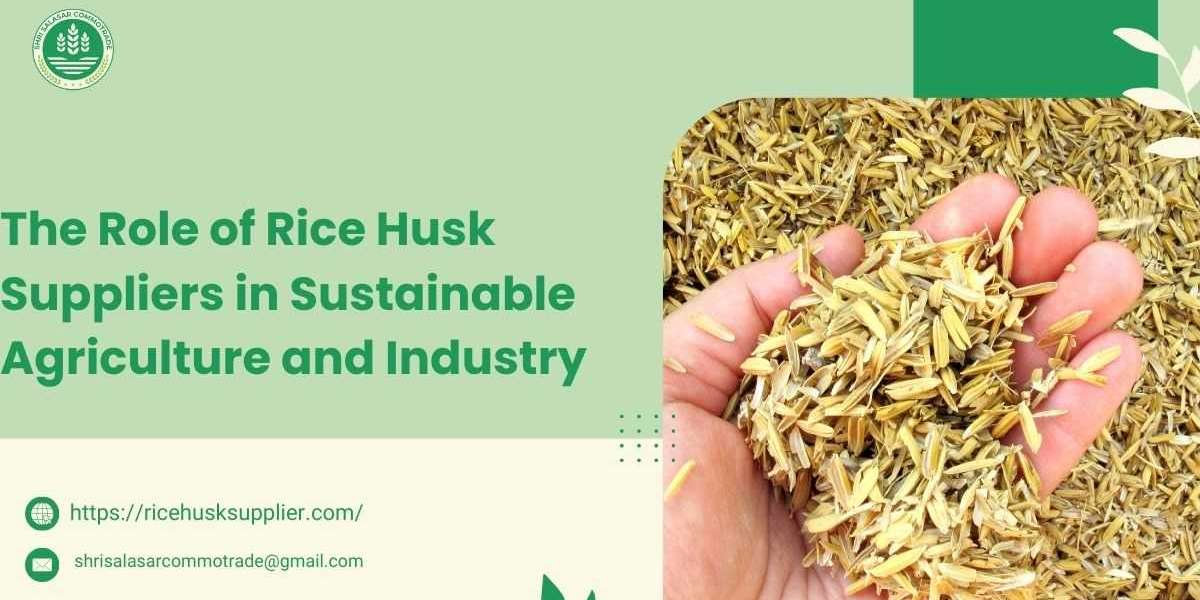Rice is one of the most widely consumed staple foods around the world, particularly in Asia. With billions of people depending on rice for their daily nutrition, it’s no surprise that rice cultivation is a major agricultural activity. However, what often goes unnoticed is the substantial amount of waste that rice production generates—specifically, rice husk. While rice husks were once regarded as a mere byproduct of rice milling, they have gained significant attention in recent years for their potential use in various industries.
In this article, we will explore the role of rice husk suppliers in both the agricultural and industrial sectors, their importance to sustainable practices, and the growing market for rice husk-based products. We'll delve into the key uses of rice husk, the environmental benefits, and the future of rice husk suppliers in the global economy.
What is Rice Husk?
Rice husk is the outer protective layer that surrounds the rice grain. It is the part of the rice plant that is removed during the milling process, leaving behind the edible rice kernel. Despite being an agricultural waste product, rice husks have a variety of valuable uses.
Typically, when rice is milled, the husks are discarded or used as low-value fuel for drying other rice or crops. In many regions, rice husks were burned in the open, which caused air pollution and environmental damage. However, with the increasing demand for sustainable alternatives and the need to reduce waste, rice husks are now being utilized in a more productive and environmentally friendly manner.
The Role of Rice Husk Suppliers
Rice husk suppliers play an essential role in the global supply chain. These suppliers collect rice husks from rice mills, process them, and supply them to industries that can utilize this material. Their role is crucial in transforming a waste product into a valuable commodity that can be used in a range of applications.
1. Sourcing Rice Husk from Rice Mills
The primary responsibility of rice husk suppliers is sourcing husks from rice milling operations. Rice milling produces significant quantities of husks, especially in countries with large rice-producing regions like India, China, Thailand, and Vietnam. Suppliers typically work directly with rice mills, where they either collect rice husks or purchase them in bulk.
Once collected, rice husks may be processed into various forms, such as raw husks, husk pellets, or husk ash, depending on the intended use. The supply chain involves storage, transportation, and often cleaning or drying the rice husks before they are shipped to end-users. This is a critical aspect of rice husk suppliers’ operations, as maintaining the quality of the husk is essential to ensure its usability in industrial applications.
2. Value Addition and Processing
Rice husk suppliers often engage in additional processing to add value to the husk. This can include the grinding of husks into powder, the creation of husk briquettes for use as fuel, or turning them into specialized products like activated carbon or silica. Some suppliers may also produce rice husk ash, which is a byproduct that is commonly used in the manufacturing of cement, construction materials, and even in agriculture as a soil conditioner.
Processing rice husks can require specialized equipment, and the quality of the final product is often a determining factor in its marketability. This added value can make rice husk suppliers more competitive in the global market and enable them to target niche markets that require higher-quality or processed rice husk products.
Key Uses of Rice Husk
Rice husks, when processed properly, can be used in a wide range of industries. These uses not only help in reducing agricultural waste but also contribute to sustainable and eco-friendly practices. Let’s look at the primary applications of rice husk:
1. Bioenergy and Fuel
One of the most common uses of rice husk is as biofuel. Rice husks are rich in cellulose, lignin, and other organic materials, which makes them an excellent source of energy. In many rice-producing countries, rice husks are burned in boilers or furnaces to produce heat and electricity. This energy can be used to power rice mills, other agricultural activities, or even be sold to the grid.
Rice husk briquettes or pellets are often produced by suppliers for use in industrial heating systems, as they are more efficient and easier to handle than raw husks. The use of rice husk as a biofuel reduces dependence on traditional fossil fuels, making it a more sustainable energy option. Additionally, it helps minimize the amount of agricultural waste that would otherwise be burned, reducing air pollution.
2. Rice Husk Ash in Construction
Another significant application of rice husks is in the production of rice husk ash, which is a byproduct of burning rice husks. Rice husk ash contains a high amount of silica, a substance that is highly valued in construction. Silica is used as a key ingredient in cement and concrete, providing strength and durability.
Rice husk ash has become a sought-after material for environmentally friendly construction. By incorporating rice husk ash into cement and concrete, suppliers can help reduce the carbon footprint of building materials, as it partially replaces traditional cement, which has a significant environmental impact. The use of rice husk ash in construction helps reduce the overall carbon emissions of the industry.
3. Agriculture and Soil Improvement
Rice husks are also used in agriculture, particularly in soil improvement and as an organic mulch. Suppliers of rice husks often provide agricultural companies with processed rice husks to be used as a soil conditioner or to improve the drainage and aeration of soil. When added to soil, rice husks improve its structure, making it less prone to compaction, while also enhancing water retention.
Additionally, rice husk ash is used as a fertilizer or soil amendment. The high silica content can improve soil quality, making it more fertile and better suited for growing crops. In this way, rice husk suppliers support sustainable agricultural practices and contribute to increasing crop yields without relying on chemical fertilizers.
4. Activated Carbon Production
Activated carbon, produced from rice husks, is another product that suppliers offer. Rice husks are converted into activated carbon through a process of heating at high temperatures, which increases the surface area and makes it more effective for adsorbing impurities. Activated carbon is used in water filtration, air purification, and even in gold mining and medical applications (like poisoning treatment).
Activated carbon made from rice husks is considered an environmentally friendly option because it utilizes an agricultural byproduct that would otherwise go to waste. Rice husk-based activated carbon is also biodegradable and non-toxic, making it an appealing alternative to traditional carbon sources.
Conclusion
Rice husk suppliers have become key players in the global push for sustainability. By turning agricultural waste into valuable products, these suppliers help reduce environmental impact and contribute to a more circular economy. From biofuels to construction materials, activated carbon, and biodegradable products, rice husk suppliers provide essential materials for industries that are striving to reduce their carbon footprints and embrace eco-friendly practices.
As demand for sustainable products continues to rise, the future looks bright for rice husk suppliers. Their ability to innovate and create value from waste is not only good for business but also good for the planet. With continued research and development, the potential uses of rice husk are only beginning to be fully realized.



